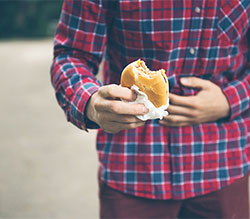Food Safety
Resources
To ensure the safety of food for consumption in suburban Cook County (excluding Oak Park, Stickney Township, Evanston and Skokie), CCDPH’s food safety program:
- Inspects food establishments and responds to food complaints in unincorporated areas and various incorporated contract towns
- Issues retail licenses to food establishments in unincorporated areas
- Investigates foodborne illnesses resulting from eating in a food establishment
- Grants permits for temporary food establishments in unincorporated areas
- Reviews cottage food applications
Contact Information
To request an inspection in unincorporated Cook County, please contact George Papadopoulos .
To request an inspection in one of our contract towns contact Kamala Nagaraj at 847-818-2844.
To apply for a license in unincorporated Cook County, please contact George Papadopoulos .
To report a foodborne illness, please call 708-836-8699 or use our complaint form so that we may begin an investigation.
To file a restaurant complaint, contact Kamala Nagaraj at 847-818-2844 or use our complaint form.
Avoiding Recalled Food Items & Food Safety Tips
Staying informed and taking appropriate actions are essential to ensure your safety. By staying vigilant and following these safety measures, you can reduce the risk of foodborne illnesses associated with recalled products.
Stay Informed
- Monitor Alerts: Follow updates from reliable sources such as the FDA, USDA, or local health departments for recall announcements.
- Use Technology: Sign up for food recall notifications via email or apps like the FoodKeeper app.
- Verify Recall Details: Check the affected product’s brand, lot number, and expiration date to confirm if it’s part of the recall.
Recalls, Market Withdrawals, & Safety Alerts | FDA
Inspect Purchased Products
- Check Pantry and Fridge: Regularly inspect your food supplies against recall information.
- Identify Affected Items: Focus on high-risk products such as meat, dairy, fresh produce, and packaged goods.
Handle Recalled Food Safely
- Do Not Consume: Avoid eating food that is part of a recall, even if it looks or smells normal.
- Dispose of Food Properly: Double-bag recalled items and place them in a sealed trash bin to prevent others from accessing them.
- Return or Refund: Many stores offer refunds or accept recalled items for safe disposal.
Report Suspected Illness
- Recognize Symptoms: Be alert to signs of foodborne illness, such as nausea, vomiting, diarrhea, and fever.
- Seek Medical Advice: Consult a healthcare provider if symptoms arise.
- Report to Authorities: Notify local health departments of suspected contaminated products; if you live in Suburban Cook County, let us know.
Apps and Resources for Food Recalls
- FoodKeeper App (developed by the USDA):
- Helps you understand food storage guidelines and provides notifications about food recalls.
- Available for download on iOS and Android.
- Provides comprehensive recall information, including food recalls.
- While it’s not an app, it offers email and text alert subscriptions.
- Visit resources like FDA recalls or Food Safety News and Recalls.gov
Stay Updated Through CDC
- CDC’s Foodborne Outbreaks Page:
- Lists updates on foodborne outbreaks and public health investigations.
- Available at CDC’s official website .
4 Tips for Food Safety
There are four steps to food safety: Clean, Separate, Cook and Chill:
- Clean – Wash your hands, surfaces, and utensils with soap and water before cooking. After cleaning surfaces where raw poultry has touched, remember to re-sanitize. Thoroughly wash fruits and vegetables before consuming.
- Separate – Use separate cutting boards, plates, and utensils to avoid cross-contamination between raw meat and foods that are ready to eat. Juices from raw meat and poultry are likely to contain harmful bacteria such as Salmonella and E. coli. While these bacteria can be destroyed with proper cooking, it is important to keep these raw juices from touching food that won’t be cooked.
- Cook – Use a thermometer to check if the turkey is cooked. You cannot tell by looking if it is fully cooked. Turkey should be cooked to 165° F. Take the temperature in three places – the thickest part of the breast, the innermost part of the thigh, and the innermost part of the wing.
- Chill – Do not leave foods at room temperature more than two hours. After you are done eating, divide the remaining food into small containers and either refrigerate or freeze. Leftovers are safe in the refrigerator for up to four days.
Keep hot foods hot and cold foods cold. After being cooked to a safe temperature, hot foods should not be allowed to get cooler than 140° F. Cold foods should not be allowed to become warmer than 40° F. Bacteria grow most rapidly in the range of temperatures between 40° F and 140° F. This range of temperatures is commonly referred to as the “Danger Zone.”
Updated September 4, 2025, 4:08 PM



